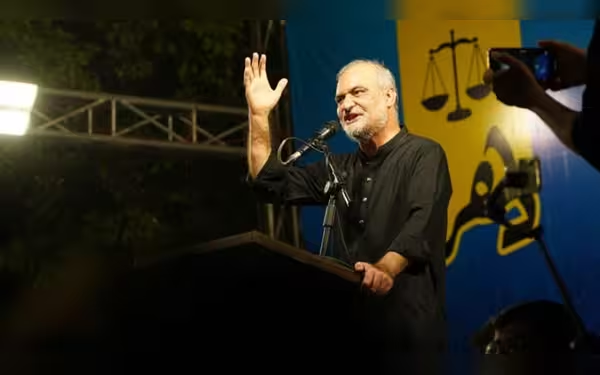Wednesday, January 15, 2025 12:55 PM
Jamaat-e-Islami Protests Against Rising Electricity Costs in Pakistan
- JI demands reduction in electricity tariffs immediately.
- Hafiz Naeem warns of escalating protests if ignored.
- Call for forensic audit of IPPs' financial dealings.
 Image Credits: geo
Image Credits: geoJamaat-e-Islami protests against rising electricity costs, demanding immediate tariff reductions and accountability from independent power producers.
In recent weeks, the rising cost of electricity in Pakistan has sparked widespread protests across the nation. Jamaat-e-Islami (JI), a prominent political party, has taken a strong stance against the government’s handling of electricity tariffs and agreements with independent power producers (IPPs). The party's Emir, Hafiz Naeem ur Rehman, has warned that if the government does not address their demands, they will escalate their sit-ins and protests.
During a sit-in outside the Governor House in Karachi on Sunday, Hafiz Naeem emphasized that JI does not seek confrontation or chaos, but they will not be seen as weak. He stated, "JI does not want confrontation and chaos but this should not be taken as its weakness." The protests have led to significant disruptions, including the closure of a major road to Islamabad, as citizens express their frustration over high electricity costs.
Naeem urged the government to take lessons from the situations in Kenya and Bangladesh, where citizens have reacted strongly to similar issues. He called for a reduction in electricity tariffs before it becomes too late, warning that people may refuse to pay their bills if the situation does not improve. He highlighted that a staggering Rs8,500 billion has already been paid to IPPs, and the public will no longer tolerate what he described as the plundering of national resources.
Furthermore, the JI Emir demanded a forensic audit of the IPPs’ accounts to uncover the truth behind the agreements that have benefited a select few. He accused the ruling class of being complicit with criminals, which he believes is why they are hesitant to take strong action against those exploiting the country’s resources. Naeem pointed out that negotiations with IPPs should be standard practice, especially in international agreements, yet the government has been reluctant to engage in discussions.
Rehman criticized both past dictators and current politicians, stating, "Both the dictators and the politicians who were planted in the former’s nurseries had failed the country." He also mentioned the role of the International Monetary Fund (IMF) in the current economic crisis, claiming that local agents of the IMF within the ruling class have exacerbated the situation.
In addition to addressing electricity costs, Naeem called for a rationalization of the tax regime to provide relief to the public. He expressed concern that the government has even imposed taxes on essential sectors such as health, education, and food security, which should be exempt under the IMF program. He urged the government to reduce interest rates immediately and work towards eliminating them gradually to help the poor.
Finally, Hafiz Naeem demanded an end to the monopoly of Karachi Electric (KE), emphasizing the need for fair competition in the energy sector. As the protests continue, it remains to be seen how the government will respond to the demands of Jamaat-e-Islami and the concerns of the citizens.
The ongoing protests led by Jamaat-e-Islami highlight the urgent need for the government to address the rising electricity costs and the agreements with IPPs. As citizens grow increasingly frustrated, it is crucial for the authorities to engage in meaningful dialogue and implement necessary reforms to alleviate the financial burden on the public. The future of Pakistan's energy sector and the well-being of its citizens depend on the government's ability to respond effectively to these pressing issues.













